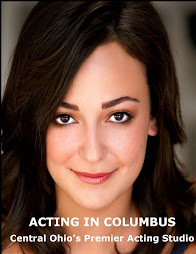 PHOTO: Acting in Columbus student Angela Geisler (l) on the set of HOMECOMING starring Mischa Barton (r)
PHOTO: Acting in Columbus student Angela Geisler (l) on the set of HOMECOMING starring Mischa Barton (r)In order to become an actor or become an actress, you must first have a passion and drive to learn your craft. However, many young actors make the mistake of not realizing that there is much more to living the actor’s life.The first step in launching a professional acting career is to set some goals. If you don't have some place to go when you get in your car, you're just going to drive around, right?
Here are some major issues you should consider:
What do you want to be doing acting-wise five years from now? Seven years? Ten years? Will you be happy to act in local productions for no money? Or do you want to be paid to act? If you are considering a professional career in acting (i.e. if you want to be paid to do it), then you'll have to get on a dedicated career track.
Actor Training
Most acting workshops are geared toward scene studies. Essentially, "scene study" involves individual scenes from a play or film which are assigned to actors -- typically no more than two or three. Throughout the course of the workshop, actors don't merely act out their scenes, they discuss their roles, the play as a whole, intentions of playwrights...all of which help make their performances better. Scenes practiced in acting workshops should not be taken lightly. Prepare each scene as if you are training for a comprehensive production. Often, you'll learn new techniques (which is the point of your instructor giving you this scene in the first place). Any new skills that you are taught in class should be implemented immediately.
During presentation of scenes, stay open to direction from your instructor. Don't argue about your motivation or why you chose to employ a certain technique. The instructor may be trying to teach you a new angle or break you of a habit you're not aware of. Remember that everything you learn in a workshop is designed to make you stronger as an actor.
Theater
Almost every city and town has at least one small community theater where local actors gather and put on performances. Take advantage of this opportunity, even if your primary interest is film and television. Acting is acting, and it changes very little between media. Any practice and exposure you get while doing community theater will only improve your chances of making it in the film industry. Also, many agents and casting directors attend plays and showcases in hopes of finding talented new actors. Remember, opportunities can come at any time.
Student Films
Is there a college in your hometown? If so, chances are they have some kind of film, media arts, or broadcasting program. Film students always need talented actors, and you could be just what they're looking for. They probably won't be able to pay you anything and the final product may not be that great, but the experience will be more than worth it. Just be sure to get a video copy of your performance and keep in contact with student director. Who knows... he or she may be the next Spielberg.
What is the most difficult thing about acting?
No, the most difficult part is not getting a role. The most difficult part is not having to audition. The most difficult part is not trying to get auditions. The most difficult part is not the rejection. The most difficult part is not getting an agent or finding a great teacher. These are what so many actors find difficult. I do not agree. Of course they are all difficult. But not nigh on to impossible. Everything listed so far can be overcome, survived, solved. I am not sure the most difficult thing about acting can always be overcome.
To me, having listened both as an actor on stage and in film and as an audience member who has studied hundreds and hundreds of actors over the years, the most difficult thing an actor has to do is to SOUND REAL WITH VARIETY IN THE VOICE. I weep when someone with a great look starts to act and instantly becomes laid back, monotonous, pulled in, fake, boring, actory, every sentence ending with a parachute drop fall. Actors spend thousands of dollars delving into the self, soul-searching, analyzing motivation and feelings, etc., etc., etc. when all that is needed is for someone to say to them, "Get real, and have variety in the voice." The rest will come. But first sound "real" and "real" does not mean boring.
Learning how to sound real with variety cannot be taught by reading a book. It is almost impossible to write about sounding real with variety. It is something that must be heard and listened to. But I promise, absolutely promise, that if you will learn to sound real and at the same time have variety in your pitch, your rhythm and your volume, I absolutely guarantee you will start to book.










